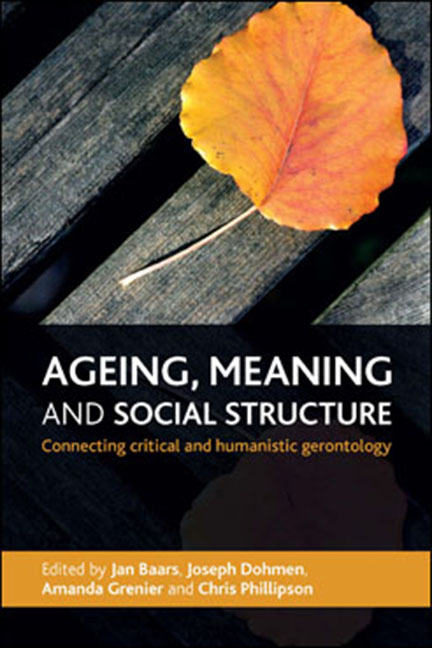Book contents
- Frontmatter
- Contents
- Notes on contributors
- Acknowledgements
- one Introduction
- two Connecting meaning with social structure: theoretical foundations
- three My own life: ethics, ageing and lifestyle
- four Rethinking agency in late life: structural and interpretive approaches
- five Dementia: beyond structures of medicalisation and cultural neglect
- six Self-realisation and ageing: a spiritual perspective
- seven Social ability or social frailty? The balance between autonomy and connectedness in the lives of older people
- eight Critical perspectives on social work with older people
- nine Community-based participatory action research: opportunities and challenges for critical gerontology
- ten Commentary: contingent ageing, naturalisation and some rays of intellectual hope
- Index
four - Rethinking agency in late life: structural and interpretive approaches
Published online by Cambridge University Press: 07 September 2022
- Frontmatter
- Contents
- Notes on contributors
- Acknowledgements
- one Introduction
- two Connecting meaning with social structure: theoretical foundations
- three My own life: ethics, ageing and lifestyle
- four Rethinking agency in late life: structural and interpretive approaches
- five Dementia: beyond structures of medicalisation and cultural neglect
- six Self-realisation and ageing: a spiritual perspective
- seven Social ability or social frailty? The balance between autonomy and connectedness in the lives of older people
- eight Critical perspectives on social work with older people
- nine Community-based participatory action research: opportunities and challenges for critical gerontology
- ten Commentary: contingent ageing, naturalisation and some rays of intellectual hope
- Index
Summary
Introduction
Over the course of the 1990s and 2000s, debates in gerontology focused around the period of the ‘fourth age’ as a complex socio-cultural construct. These contributions have moved beyond the long-standing use of the ‘fourth age’ as an uncritical age-based criterion in research samples (for example, 80+) or simply as a marker of eligibility for services. At the same time, however, they have produced a new set of challenges for interpretations of the fourth age, and in particular, concerns about the extent to which agency may be said to operate within this period of the lifecourse. The assumption that agency is either present or absent is one that plays out in academic debates and organisational practices. Although the focus on older people at advanced ages with impairments is long overdue, concerns with regards to the role of agency within late old age are also beginning to emerge.
Agency, and the enactment of agency through participation and activity, is often assumed in the public and social context. As populations live longer, healthier lives, policy discourses and socio-political interventions are increasingly organised around models of ‘active’, ‘successful’ and ‘productive’ ageing (Katz, 2000). Frameworks for ‘growing old’ are ordered around ‘third age’ issues of health and wellness with older people expected to live out their later years as productive and active citizens. The academic literature has captured this trend by focusing on the changing lifestyles and patterns of consumption of older people (Featherstone and Wernick, 1995; Gilleard and Higgs, 2000). Linked with this are calls to empower older people in social and health services as well as to encourage participation and the inclusion of their ‘voice’ in research (see Chapter Nine, this volume). While such positive involvement of older people is desirable, the altered contemporary context that focuses almost exclusively on health raises new challenges for debates around agency and the ‘fourth age’.
Forms of agency that are constructed as dependent on a degree of health that is less likely to be present in the ‘fourth age’ create discrepancies for older people with impairments. The dominant focus on health tends to assume that agency is possible, and in doing so, implicitly establishes agency as an objective of involvement and vice versa, whether on the social or practical level. In doing so, the implied message is that health, activity and independence are necessary for agency.
- Type
- Chapter
- Information
- Ageing, Meaning and Social StructureConnecting Critical and Humanistic Gerontology, pp. 55 - 80Publisher: Bristol University PressPrint publication year: 2013
- 1
- Cited by



